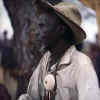The Ovamboland Affairs Proclamation, No. 27 of 1929, is passed. This law provides, inter alia, for the setting aside of Ovamboland as a "native reserve for the sole use and occupation of the Ovambo, for the creation of trust funds for each of the tribes in Ovamboland, for the payment of levies by members of the various tribal groupings to those funds, and for the moneys in the funds to be expended by the Administrator".
The first automatic telephone service is inaugurated in Windhoek by Administrator Werth. The first call is made to Mayor John Meinert.
The Windhoek-Gobabis railway line is substantially completed.
A new telephone line is extended from Ondekaremba to Gobabis.
A Roman Catholic mission station is established in Bunya in the Mbunza area of the Kavango.
Mbukushu King Disho I dies. Successor is Dimbu II (until 1939). Dimbu’s heir, Disho II, is exiled to Botswana by the South Africnas in 1947, returns, however, to Namibia in 1969.
The Mbukushu King (1939-1947) Disho II who
was sent into Exile by the South Africans in 1947 at Mukwe, June 1975
Copyright of Photo: Dr. Klaus Dierks
From 1947 to 1969 the Mbukushu area is ruled by King Max Makushe. After
1969 the Mbukushu kingdom is represented by Fumu Alfons Majavero und Fumu Frans Dimbare.
The first oil well is drilled near Berseba. There is a gas blow out during the drilling
but no oil is discovered.
A government delegation from Windhoek tries to cross the western Caprivi Strip from Andara. The delegation is not able to traverse the Kwando River and is forced to return. These transport-related problems are the reason that the administration of the Caprivi Strip reverts back to Pretoria in 1939.
